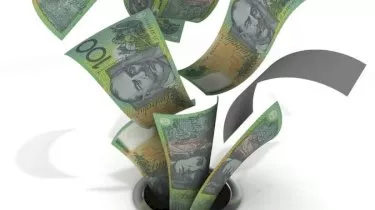Invest
Aussies losing $466m in loose change every year
The amount of small change lost by the Australian adult population every year is enough to buy Australia’s most expensive house nearly seven times over, or a whole lot of avocado on toast.
Aussies losing $466m in loose change every year
The amount of small change lost by the Australian adult population every year is enough to buy Australia’s most expensive house nearly seven times over, or a whole lot of avocado on toast.

According to new data from ING, more than half of Australian adults “don’t think twice” about losing spare change and this is costing them $38.85 million a month.
That’s equivalent to $466 million year, or the $70 million+ sale price of the Point Piper mansion, ‘Elaine’, seven times over.
“The research shows that we’re literally throwing away money by paying with cash. Those loose coins could be adding up to a tidy sum but most of us don’t even think twice about them,” said ING’s head of product, Tim Newman.
Millennials are the most flippant with their spare change, with 40 per cent of those between 18 and 34 losing up to $10 a month.

More than a third (36 per cent) of those who are 35-49 are losing up to $10 a month. Older Australians are less likely to lose change, with just 19 per cent of those between 50 and 64 and 15 per cent of those older than 65 losing up to $10 a month.
Women tend to be more careful with their loose change, with just over one-quarter (26 per cent) losing up to $10 a month. That’s compared to one-third of men.
ING adds that it’s not just money that’s being lost. Twenty-eight per cent of respondents of the more than 1,000 surveyed said they “hate carrying coins” and 11 per cent said they hate it so much that they actually throw loose change away.
Why are we throwing our money away?
Forty per cent of respondents said that they throw away loose change because they “can’t use 5 cents”.
Twenty-nine per cent said it’s because they find the coins inconvenient.
Twenty-seven per cent said it “bulks up their wallet”.
However, 40 per cent of respondents said finding loose change makes them feel happy and 17 per cent said it made them feel “pleased or smug”.
“It’s ironic that many people will actually throw away their spare change, however get satisfaction out of finding money,” said Mr Newman.
“Many people are eliminating the ‘inconvenience’ of cash by turning to contactless payment methods such as mobile pay. Not only can contactless payments ensure you’re not carrying loose change, contactless also ensures you’re not losing or throwing your money away,” he continued.
The research was carried out to coincide with ING’s new digital savings tool, Everyday Round Up, which allows people to save and earn interest on their “loose change” by funnelling the “loose change” accrued through purchases into a savings maximiser account.

Spending
Household Spending Pops, Rate Hike Looms: A CFO Playbook from an Australian Retail Case
Fresh ABS data shows household outlays running hotter than expected, particularly in services—stoking calls for an RBA move as early as February. For operators, the macro headline is simple; the ...Read more

Spending
State Street economist comments on softer-than-expected CPI data
In light of the latest Consumer Price Index (CPI) data release, Krishna Bhimavarapu, APAC Economist at State Street Investment Management, has provided insight into the implications for the Australian ...Read more

Spending
Moneysmart study reveals Gen Z women more concerned about finances than men
A new research conducted by ASIC’s Moneysmart has unveiled the heightened levels of stress and concern regarding finances and the cost of living among Australian Gen Z women compared to their male ...Read more

Spending
The cost of politeness: Aussies out of pocket by $1,350 due to 'awkward tax'
It's the time of year when Australians dive into their pockets for festive events and gatherings, yet a recent study by PayPal suggests that many are too polite, or perhaps too embarrassed, to ask for ...Read more

Spending
Aussies can ‘NAB Now Pay Later’ with the last major bank to embrace BNPL
NAB has become the latest bank to enter the BNPL market. Read more

Spending
Aussie households spent $368 a week on transport after petrol price surge
Fuel costs have increased by 40 per cent over the past year, a new report from the Australian Automobile Association has revealed. Read more

Spending
Voters say reducing the cost of living should be the government’s top priority
Aussies have ranked high cost of living as the top issue that needs to be addressed by the next government. Read more

Spending
Bodies back Labor’s commitment to stronger BNPL regulation
All parties should commit to stronger regulations for the BNPL sector, according to Financial Counselling Australia. Read more

Spending
Household Spending Pops, Rate Hike Looms: A CFO Playbook from an Australian Retail Case
Fresh ABS data shows household outlays running hotter than expected, particularly in services—stoking calls for an RBA move as early as February. For operators, the macro headline is simple; the ...Read more

Spending
State Street economist comments on softer-than-expected CPI data
In light of the latest Consumer Price Index (CPI) data release, Krishna Bhimavarapu, APAC Economist at State Street Investment Management, has provided insight into the implications for the Australian ...Read more

Spending
Moneysmart study reveals Gen Z women more concerned about finances than men
A new research conducted by ASIC’s Moneysmart has unveiled the heightened levels of stress and concern regarding finances and the cost of living among Australian Gen Z women compared to their male ...Read more

Spending
The cost of politeness: Aussies out of pocket by $1,350 due to 'awkward tax'
It's the time of year when Australians dive into their pockets for festive events and gatherings, yet a recent study by PayPal suggests that many are too polite, or perhaps too embarrassed, to ask for ...Read more

Spending
Aussies can ‘NAB Now Pay Later’ with the last major bank to embrace BNPL
NAB has become the latest bank to enter the BNPL market. Read more

Spending
Aussie households spent $368 a week on transport after petrol price surge
Fuel costs have increased by 40 per cent over the past year, a new report from the Australian Automobile Association has revealed. Read more

Spending
Voters say reducing the cost of living should be the government’s top priority
Aussies have ranked high cost of living as the top issue that needs to be addressed by the next government. Read more

Spending
Bodies back Labor’s commitment to stronger BNPL regulation
All parties should commit to stronger regulations for the BNPL sector, according to Financial Counselling Australia. Read more








